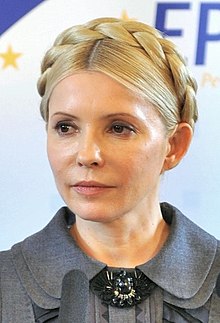Yulia Tymoshenko
| People's Deputy of Ukraine | ||||
|---|---|---|---|---|
| 2nd convocation | ||||
| 16 January 1997 – 12 May 1998 | ||||
|
Elected as: Independent, Kirovohrad Oblast, District No.229 |
||||
| 3rd convocation | ||||
| 12 May 1998 – 2 March 2000 | ||||
|
Elected as: Hromada, Kirovohrad Oblast, District No.99 |
||||
| 4th convocation | ||||
| 14 May 2002 – 4 February 2005 | ||||
| Elected as: Yulia Tymoshenko Bloc, No.1 | ||||
| 5th convocation | ||||
| 25 May 2006 – 14 June 2007 | ||||
| Elected as: Yulia Tymoshenko Bloc, No.1 | ||||
| 6th convocation | ||||
| 23 November 2007 – 19 December 2007 | ||||
| Elected as: Yulia Tymoshenko Bloc, No.1 | ||||
| 8th convocation | ||||
| 27 November 2014 – Present | ||||
| Elected as: Fatherland, No.2 | ||||
Yulia Volodymyrivna Tymoshenko (Ukrainian: Ю́лія Володи́мирівна Тимоше́нко, pronounced [ˈjulʲijɐ voɫoˈdɪmɪrʲivnɐ tɪmoˈʃɛnko], née Hrihyan, Грігян, born 27 November 1960) is a Ukrainian politician. She co-led the Orange Revolution and was the first woman appointed Prime Minister of Ukraine, serving from 24 January to 8 September 2005, and again from 18 December 2007 to 4 March 2010.
Tymoshenko is the leader of the All-Ukrainian Union "Fatherland" political party that has 19 seats in parliament and has Tymoshenko as its parliamentary faction leader. In the 2012 Ukrainian parliamentary election the party had received the second most votes, winning 101 of parliament's 450 seats.
In the 2014 Ukrainian presidential election Tymoshenko received 12.81% of the vote, coming in second place after Petro Poroshenko who won the election with 54.7%. Tymoshenko finished second in the Ukrainian presidential election of 2010 runoff, losing by 3.5 percentage points to the winner, Viktor Yanukovych. In the first round she had also finished second.
After the 2010 presidential election, a number of criminal cases were brought against her. On 11 October 2011 she was convicted of embezzlement and abuse of power, and sentenced to seven years in prison and ordered to pay the state $188 million. The prosecution and conviction were viewed as politically biased by many governments – most prominently the European Union, who repeatedly called for the release of Tymoshenko as the primary condition for signing the EU Association Agreement, the US, and international organizations such as Human Rights Watch and Amnesty International. She was released on 22 February 2014, in the concluding days of the Euromaidan revolution, following a revision of the Ukrainian criminal code that effectively decriminalized the actions for which she was imprisoned. The decision was supported by 322 votes. She was officially rehabilitated on 28 February 2014. Just after the Euromaidan revolution, the Ukrainian Supreme Court and European Court of Human Rights closed the case and found that "no crime was committed".
...
Wikipedia

